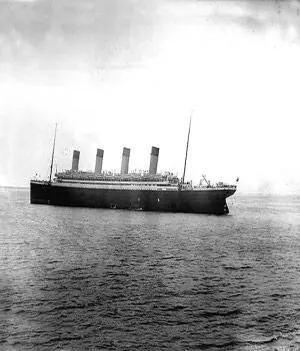And so on, horror piled on horror, and not a word of it true, or remotely approaching the truth.
This paper was selling in the streets of New York while the Carpathia was coming into dock, while relatives of those on board were at the docks to meet them and anxiously buying any paper that might contain news. No one on the Carpathia could have supplied such information; there was no one else in the world at that moment who knew any details of the Titanic disaster, and the only possible conclusion is that the whole thing was a deliberate fabrication to sell the paper.
This is a repetition of the same defect in human nature noticed in the provision of safety appliances on board ship—the lack of consideration for the other man. The remedy is the same—the law: it should be a criminal offence for anyone to disseminate deliberate falsehoods that cause fear and grief. The moral responsibility of the press is very great, and its duty of supplying the public with only clean, correct news is correspondingly heavy. If the general public is not yet prepared to go so far as to stop the publication of such news by refusing to buy those papers that publish it, then the law should be enlarged to include such cases. Libel is an offence, and this is very much worse than any libel could ever be.
It is only right to add that the majority of the New York papers were careful only to report such news as had been obtained legitimately from survivors or from Carpathia passengers. It was sometimes exaggerated and sometimes not true at all, but from the point of reporting what was heard, most of it was quite correct.
One more thing must be referred to—the prevalence of superstitious beliefs concerning the Titanic. I suppose no ship ever left port with so much miserable nonsense showered on her. In the first place, there is no doubt many people refused to sail on her because it was her maiden voyage, and this apparently is a common superstition: even the clerk of the White Star Office where I purchased my ticket admitted it was a reason that prevented people from sailing. A number of people have written to the press to say they had thought of sailing on her, or had decided to sail on her, but because of “omens” cancelled the passage. Many referred to the sister ship, the Olympic, pointed to the “ill luck” that they say has dogged her—her collision with the Hawke, and a second mishap necessitating repairs and a wait in harbour, where passengers deserted her; they prophesied even greater disaster for the Titanic, saying they would not dream of travelling on the boat. Even some aboard were very nervous, in an undefined way. One lady said she had never wished to take this boat, but her friends had insisted and bought her ticket and she had not had a happy moment since. A friend told me of the voyage of the Olympic from Southampton after the wait in harbour, and said there was a sense of gloom pervading the whole ship: the stewards and stewardesses even going so far as to say it was a “death-ship.” This crew, by the way, was largely transferred to the Titanic.
The incident with the New York at Southampton, the appearance of the stoker at Queenstown in the funnel, combine with all this to make a mass of nonsense in which apparently sensible people believe, or which at any rate they discuss. Correspondence is published with an official of the White Star Line from some one imploring them not to name the new ship “Gigantic,” because it seems like “tempting fate” when the Titanic has been sunk. It would seem almost as if we were back in the Middle Ages when witches were burned because they kept black cats. There seems no more reason why a black stoker should be an ill omen for the Titanic than a black cat should be for an old woman.
The only reason for referring to these foolish details is that a surprisingly large number of people think there may be “something in it.” The effect is this: that if a ship’s company and a number of passengers get imbued with that undefined dread of the unknown—the relics no doubt of the savage’s fear of what he does not understand—it has an unpleasant effect on the harmonious working of the ship: the officers and crew feel the depressing influence, and it may even spread so far as to prevent them being as alert and keen as they otherwise would; may even result in some duty not being as well done as usual. Just as the unconscious demand for speed and haste to get across the Atlantic may have tempted captains to take a risk they might otherwise not have done, so these gloomy forebodings may have more effect sometimes than we imagine. Only a little thing is required sometimes to weigh down the balance for and against a certain course of action.
At the end of this chapter of mental impressions it must be recorded that one impression remains constant with us all to-day—that of the deepest gratitude that we came safely through the wreck of the Titanic; and its corollary—that our legacy from the wreck, our debt to those who were lost with her, is to see, as far as in us lies, that such things are impossible ever again. Meanwhile we can say of them, as Shelley, himself the victim of a similar disaster, says of his friend Keats in “Adonais»:—
“Peace, peace! he is not dead, he doth not sleep—
He hath awakened from the dream of life—
He lives, he wakes—
’Tis Death is dead, not he;
Mourn not for Adonais.”

THE END
See Figure 2, page 116.
In an account which appeared in the newspapers of April 19 I have described this boat as 14, not knowing they were numbered alternately.
See Figure 4, page 50.
See Figures 1 and 2 page 116.













